What Small Dog Breeds Can Tolerate Cold Weather Well?
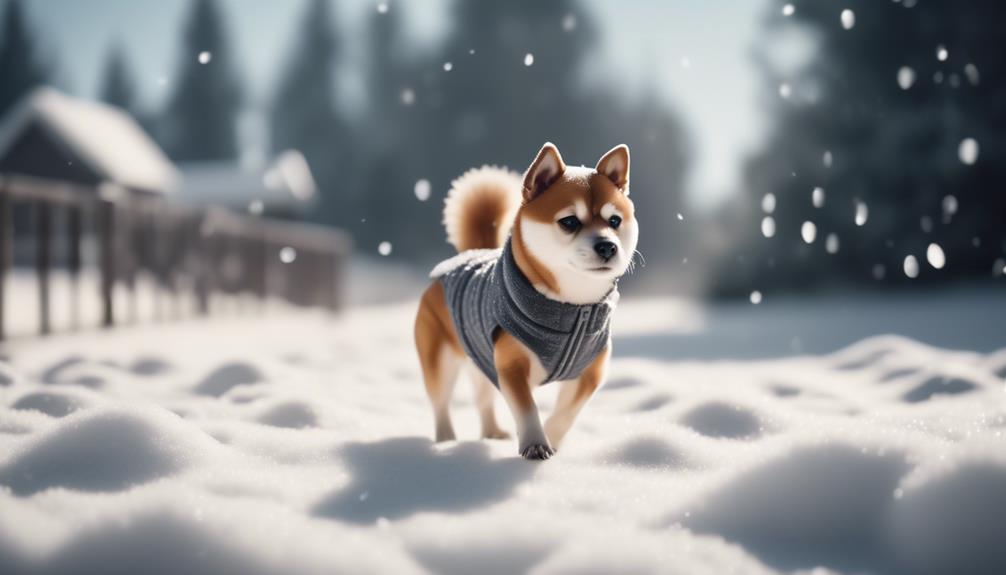
Small dog breeds that can tolerate cold weather well:
- Shiba Inu
- Alaskan Klee Kai
- American Eskimo Dog
Key Takeaways
- Terriers such as the Australian Terrier, Bedlington Terrier, Border Terrier, and Cairn Terrier have coats that act as protective barriers against the cold weather.
- Boston Terriers may not have much insulation with their short, smooth coats, so proper protection such as dog sweaters or jackets is important in very cold temperatures.
- Brussels Griffons have shaggy, wiry coats that provide insulation and help regulate body temperature in cold weather, making them suitable for colder climates.
- Cockapoos with shaggy or curly coats are adaptable to different climates and provide warmth and comfort in cold weather conditions.
Australian Terrier
The Australian Terrier, with its rough coat and weather-resistant double coat, is well-suited for cold weather due to its ability to regulate body temperature and tolerate chilly conditions. This small dog breed possesses an undercoat that provides insulation and helps retain body heat, while its thick double coat serves as a protective barrier against low temperatures. The combination of these two coat layers enables the Australian Terrier to withstand harsh winter climates and remain comfortable during winter walks or other outdoor activities.
In addition to its coat, the Australian Terrier's sturdy build and resilience contribute to its suitability for cold weather. Despite its small size, this breed exhibits a robust physique that allows it to endure challenging weather conditions. The Australian Terrier's adaptability to various climates, including cold weather, is a testament to its hardiness and ability to thrive in different environments.
When considering small dog breeds that can tolerate cold weather well, the Australian Terrier stands out as a reliable companion. Its ability to regulate body temperature, coupled with its double coat and sturdy build, make it an ideal choice for individuals seeking a small dog breed that can comfortably navigate and enjoy cold climates.
Bedlington Terrier
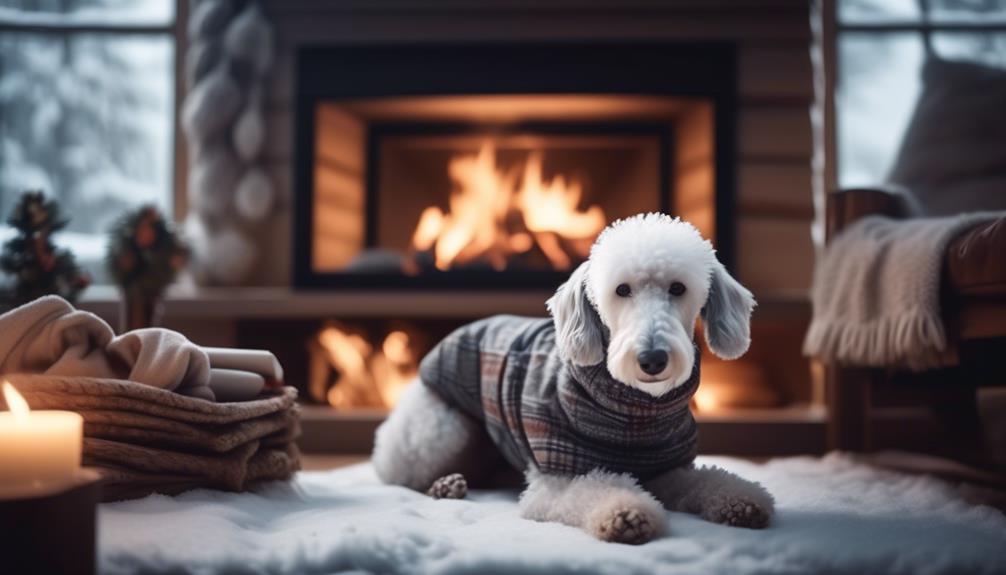
With its distinctive curly and woolly coat, the Bedlington Terrier is well-equipped to withstand cold weather conditions. Similar to the Bernese Mountain Dog, this small breed has a dense undercoat that provides insulation and helps regulate their body temperature in chilly climates. The Bedlington Terrier's coat, resembling that of a sheep, acts as a natural barrier against the cold, keeping them warm and protected. This unique coat texture and structure allow them to thrive in colder environments.
In addition to their coat, Bedlington Terriers have a resilient nature and high endurance, making them capable of enduring cold temperatures. Their small size enables them to conserve body heat efficiently, further aiding them in staying warm. The combination of their coat and body composition allows them to adapt and thrive in cold weather conditions.
When it comes to small dog breeds that can tolerate cold weather well, the Bedlington Terrier is an excellent choice. Their distinctive coat, endurance, and ability to regulate their body temperature make them well-suited for colder climates. Whether it's a winter hike or a snowy adventure, the Bedlington Terrier will be a reliable companion, keeping you warm and cozy in the cold.
Border Terrier
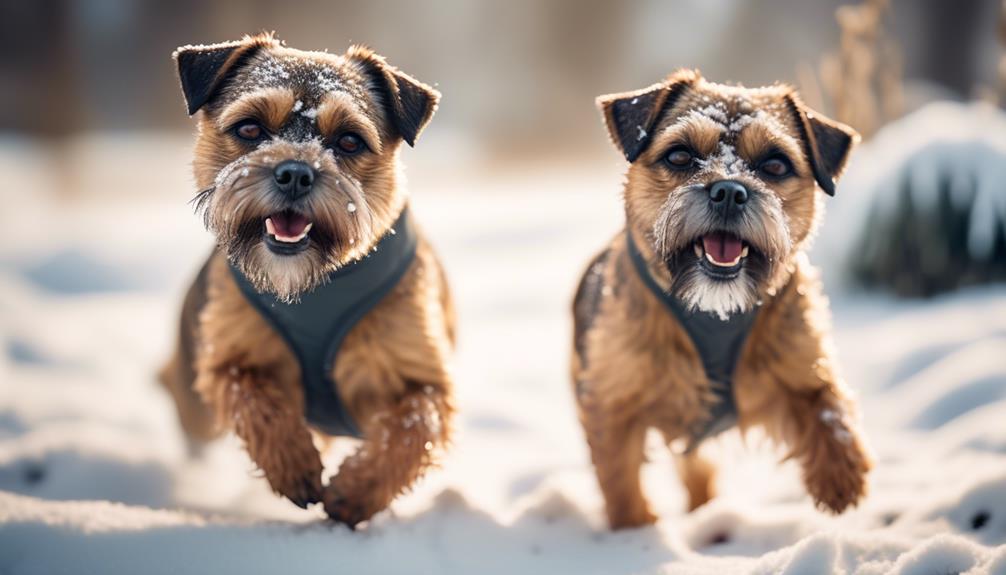
Similar to the Bedlington Terrier, the Border Terrier is a small breed that thrives in cold weather due to its wiry coat and resilient nature. Here are four reasons why the Border Terrier is well-suited for cold weather climates:
- Wiry coat: The Border Terrier has a rough, dense, and wiry outer coat that acts as a protective barrier against chilly temperatures. This coat helps to keep the dog warm by trapping air close to the body and insulating against the cold.
- Short, soft undercoat: In addition to its wiry outer coat, the Border Terrier also possesses a short, soft undercoat. This undercoat provides an extra layer of insulation, keeping the dog comfortable even in freezing temperatures.
- Hardy and resilient nature: Border Terriers are known for their hardy and resilient nature. They've a strong drive to explore and play, making them well-suited for cold weather activities such as hiking or snowshoeing with their owners.
- Adaptability to various climates: The Border Terrier's weather-resistant double coat helps protect them from harsh elements, making them adaptable to various climates. Whether it's a chilly winter day or a cool, breezy evening, the Border Terrier can handle it with ease.
When considering a new pup for cold weather, the Border Terrier's small size, wiry coat, and resilient nature make it an excellent choice for those looking for a companion that can handle the cold. Just remember to provide regular grooming to maintain the coat's insulating properties and keep your furry friend comfortable in any weather.
Boston Terrier
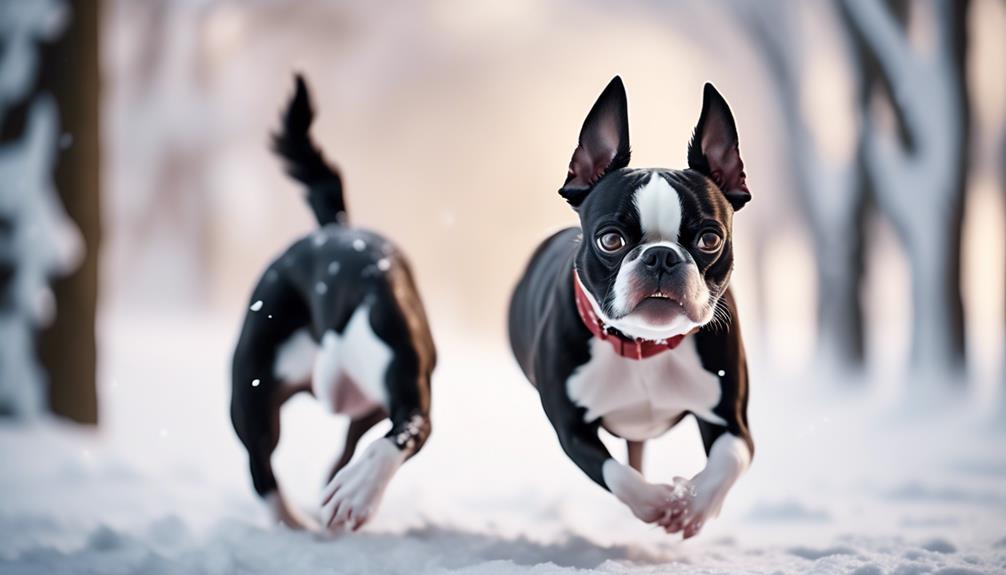
Boston Terriers, despite their small size, may require extra protection in cold weather due to their surface area to volume ratio. These small dogs, known for their friendly and lively nature, have a short, smooth coat that may not offer as much insulation in very cold temperatures. While they've a moderate energy level and training needs, their likelihood to bark makes them alert in cold weather conditions. Boston Terriers are also moderately appropriate for small homes due to their size and energy levels.
To help Boston Terriers tolerate the cold, it's important to provide them with proper protection. This can include dressing them in dog sweaters or jackets to keep them warm during walks or outdoor activities. Additionally, providing them with a warm and cozy bed or blanket indoors can help keep them comfortable in colder temperatures. It's also important to limit their exposure to cold weather and provide them with adequate exercise and mental stimulation indoors.
Brussels Griffon
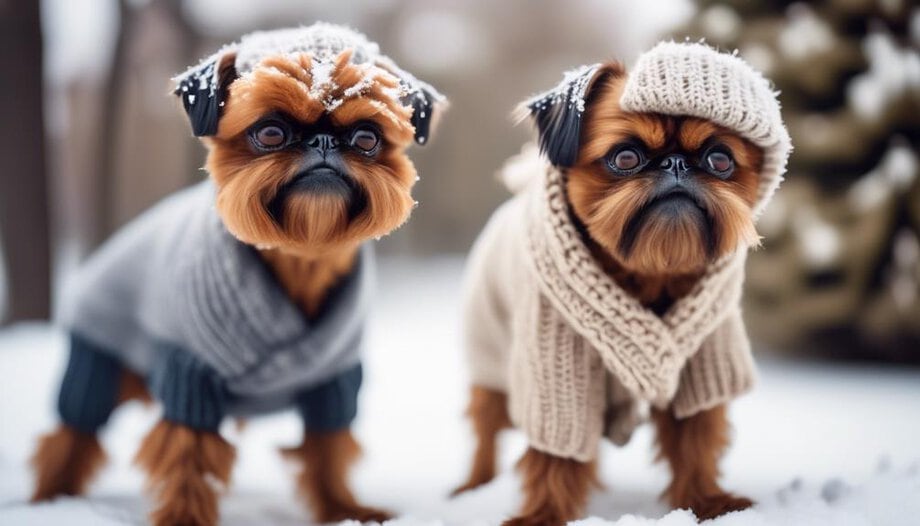
Despite their small size, Brussels Griffons are well-suited for cold weather due to their wiry coat that provides excellent insulation. Here are four reasons why Brussels Griffons can tolerate cold weather well:
- Coat Type: The Brussels Griffon's shaggy, wiry coat acts as a protective barrier against the cold. This coat type helps to trap heat close to the body, keeping the dog warm even in chilly temperatures.
- Insulation: The Brussels Griffon's coat provides excellent insulation due to its dense texture. The wiry hairs create an extra layer of warmth by trapping air close to the body, preventing heat loss.
- Body Temperature Regulation: The wiry coat of the Brussels Griffon helps it regulate its body temperature in cold weather. It keeps the dog warm in lower temperatures and prevents overheating when the temperature rises.
- Adaptability: Despite being a small dog breed, Brussels Griffons have adapted to various climates over time. Their coat type enables them to thrive in colder climates and withstand harsh weather conditions.
While breeds like the Siberian Husky and Alaskan Malamute are well-known for their ability to endure extreme cold due to their thick undercoat, Brussels Griffons are small dog breeds that can also tolerate cold weather well. Their wiry coat provides insulation and helps regulate body temperature, making them suitable for colder climates.
Cairn Terrier
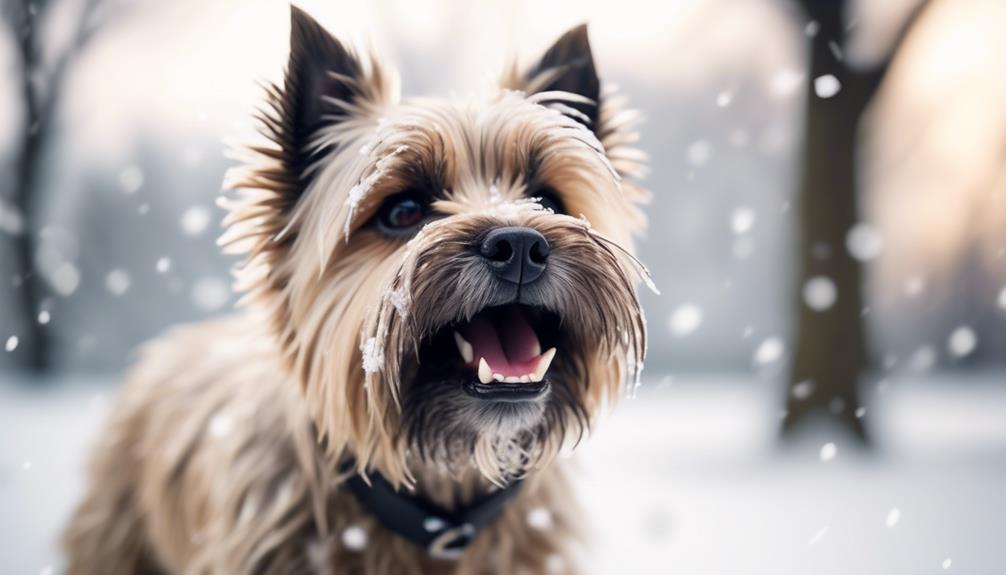
Cairn Terriers' resilient and weatherproof coat, along with their compact size, makes them well-suited for cold weather. These small dog breeds have a shaggy double coat that provides excellent insulation against low temperatures. The Cairn Terrier's undercoat is dense and wiry, acting as a barrier that helps retain body heat and keep out the cold. This characteristic makes them highly adaptable to colder climates.
Despite their small size, Cairn Terriers are known for their hardiness and adaptability in various weather conditions, including cold weather. Their rugged double coat and sturdy build enable them to thrive in colder environments. The weather-resistant coat not only protects them from the cold but also helps to repel moisture, keeping them dry and comfortable in wet and snowy conditions.
When it comes to cold weather, Cairn Terriers are well-equipped to handle the elements. Their compact size allows them to navigate through snow and uneven terrain with ease. They're energetic and agile, making them great companions for outdoor activities in colder climates.
Cockapoo
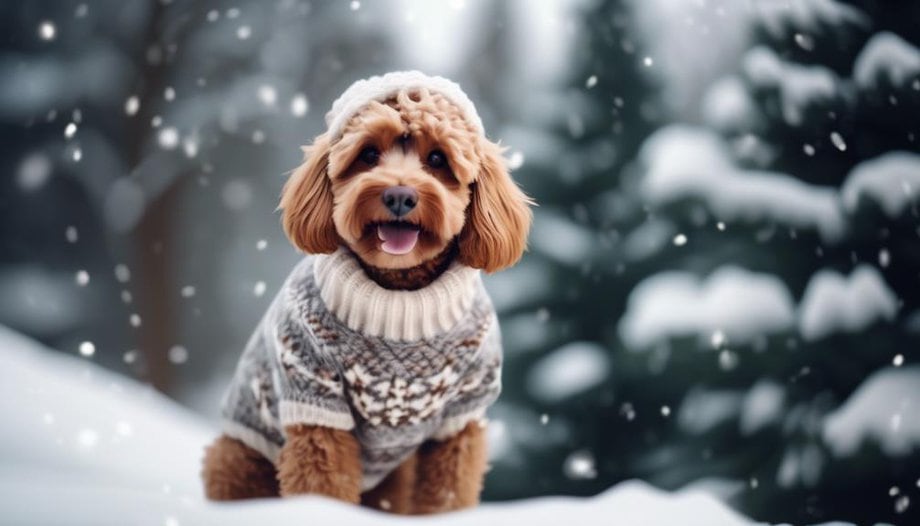
With their shaggy or curly coat providing insulation against cold weather, Cockapoos are a small dog breed that proves adaptable to various climates. Here are four reasons why Cockapoos can tolerate cold weather well:
- Coat: Cockapoos have a thick, double-layered coat that helps to keep them warm in colder temperatures. The undercoat acts as an insulating layer, trapping body heat and preventing cold air from reaching the skin.
- Adaptability: Being a mix of Cocker Spaniel and Poodle, Cockapoos inherit traits from both breeds that make them adaptable to different weather conditions, including cold climates. Their genetic makeup allows them to adjust to temperature changes and thrive in various environments.
- Intelligence: Cockapoos are known for their intelligence, which enables them to adapt to cold weather conditions and respond well to training. This makes them well-suited for outdoor adventures in colder regions, as they can learn to navigate and protect themselves in challenging weather conditions.
- Size and Energy Levels: Cockapoos are small in size and have moderate energy levels. This makes them suitable for living in smaller homes or apartments, including those located in colder regions. Their smaller size means they've less body surface area to lose heat from, while their energy levels enable them to stay active and generate body warmth even in chilly weather.
Frequently Asked Questions
What Is the Best Small Dog for Cold Weather?
The best small dog for cold weather depends on the specific needs of the dog. Factors such as coat type, size, and breed should be considered when selecting a small dog breed that can tolerate cold weather well.
What Temperature Is Too Cold for Small Breed Dogs?
Small breed dogs have a higher risk of feeling the cold due to their smaller size and larger surface area to volume ratio. It is important to protect them from low temperatures to prevent hypothermia and other health issues.
Can Small Dogs Survive Outside in the Cold?
Small dogs can survive outside in the cold with proper care. Tips include keeping them warm with winter coats, providing indoor activities, ensuring proper nutrition, preventing health risks, and creating a cozy outdoor space.
What Is the Best Hypoallergenic Dog for Cold Weather?
The best hypoallergenic dog for cold weather is the Boston Terrier. It is small and has a short coat, making it easier to groom. To keep small dogs warm in cold weather, owners can provide them with winter accessories.









